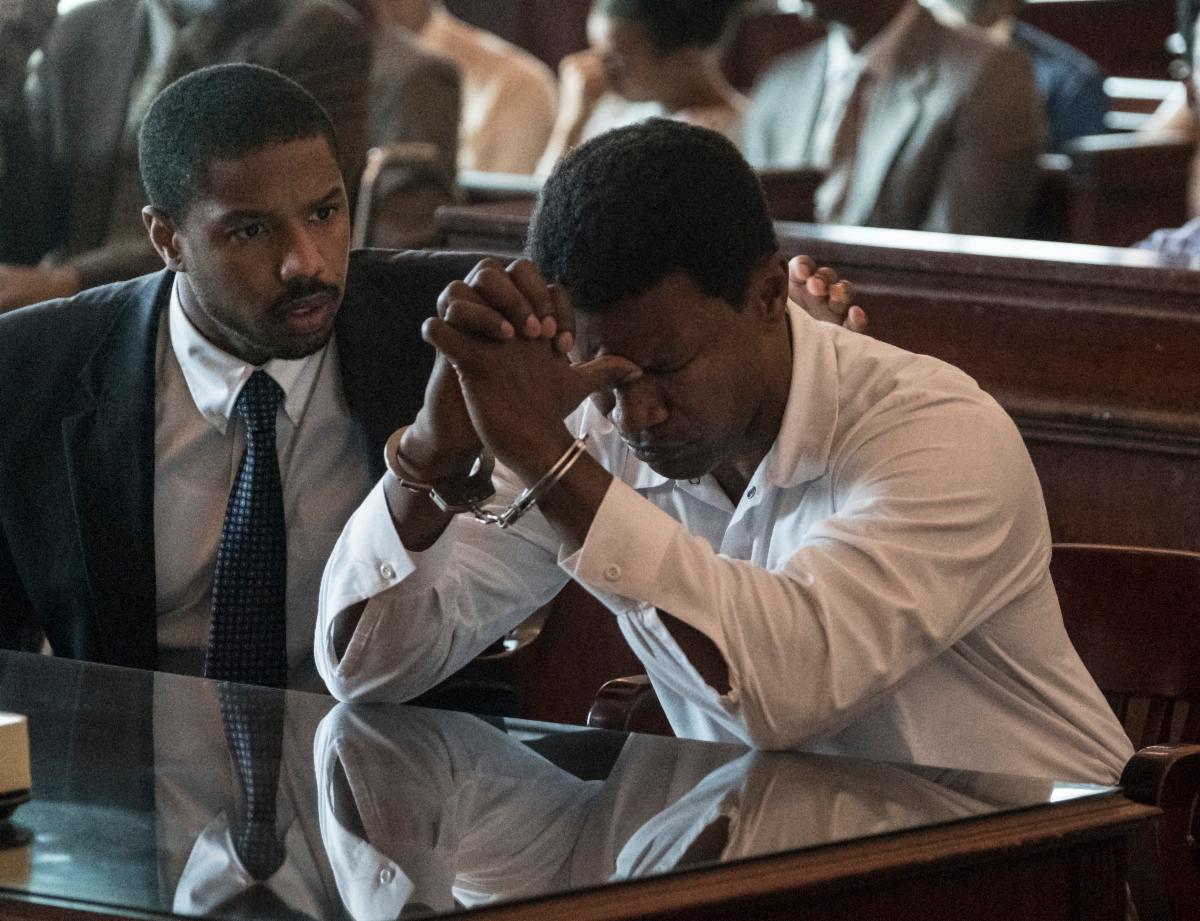Not all movies should be nuanced character studies about morally complicated characters. Sometimes a movie is meant to shine a light on wonderful, driven people who do the right thing despite their difficult circumstances. Director Destin Daniel Cretton already successfully made the former type of movie. Now he successfully makes an inspirational tale of crusading Civil Rights Defense Attorney Bryan Stevenson (Michael B. Jordan). Just Mercy shows just how special Stevenson is in one of his early cases, forecasting the heroic career of a special person.
The case we look at in Stevenson’s life takes place when Stevenson moved to Alabama right after he gets his Ivy League degree. The case is about Walter McMillian (Jamie Foxx), an African-American man wrongfully convicted of murdering a white woman. When Stevenson reviews the “facts” of the case with his partner Eva Ansley (Brie Larson), he’s shocked at how the case was botched by the defense, and hopes to disprove the poorly presented narrative that landed Walter in prison. The seemingly open and shut acquittal unfortunately makes Stevenson cognizant of his new surroundings, as district attorney Tommy Chapman (Rafe Spall) impedes the case at every turn afraid of the political uprising it might cause in his Caucasian community.
Just Mercy’s best moments are about what institutional racism does to a community, but especially the black community. Bryan Stevenson thinks this case is easy to prove: there’s multiple witnesses who could testify they were with Walter, or witnessed the murder. The key witness for the prosecution, Ralph Myers (Tim Blake Nelson), longs to clear his soul for the wrongoings he did in this case. In addition, there are all sorts of procedural peculiarities Stevenson could exploit to get Walter a fair trial. However, almost all the witnesses are afraid to come forward because of Tommy Chapman, and the state of Alabama, which uses fear and intimidation tactics or quid pro quos to scare any of these people from testifying. These tactics also put a strain on Walter’s family, which makes Walter want to just give up to save his family the turmoil and potential consequences of opening up past wounds in Chapman’s community. And when Stevenson tries other methods to obtain information for his client, the system forces him to get signatures from the very people responsible in Walter’s conviction, not exactly fair. Impasses at every corner. Threats on any helpers. Just Mercy points out how this process is designed to bury and forget anyone society deems unreasonable, even if they’re a lonely sad black man suffering from PTSD after defending America in Vietnam (a spectacular Rob Morgan).
But this systemic oppression has never faced someone like Bryan Stevenson before, a well educated defense attorney who strives for justice and equality each and every day he works, and maybe most importantly, looks like the people he represents. Stevenson’s first obstacle is the skepticism he gets from death row inmates who’ve been blindsided early and often by the “justice” system where the prosecution won’t even go visit Walter’s or anyone’s family. Stevenson is not those attorney’s; he earns the family’s trust, and more importantly, doesn’t back down when hit with judicial adversity in a case. Michael B. Jordan is a good actor, but this job is easy: he just has to be caring, smart, and heroic-looking like Bryan Stevenson must appear to a lost soul run afoul of an imperfect biased system. Over and over again we see him, Eva, or the rest of his team beat obstacle after obstacle in smart or forceful ways, depending on the situation. Because this movie is a sports movie about an underdog overcoming the odds to win. Just Mercy is not interested in moral complications, because there aren’t any, like in the Mr. Rogers documentary. We just want to see the good person win in the end, and feel happy that there are great people like Bryan Stevenson looking out for the hopeless and forgotten, and maybe inspire us to do the same.
And if Just Mercy is one thing, it is inspirational. Totally deserving for a man who is the best of us, and cares enough to represent maybe not the best of us. Bryan Stevenson gets the movie treatment he deserves, which I’m guessing will make him happy not because he’s played by Michael B. Jordan, but because the movie shines a light on the fight he goes through day in and day out, in hopes we’ll be inspired to help him with that fight. Case closed.

